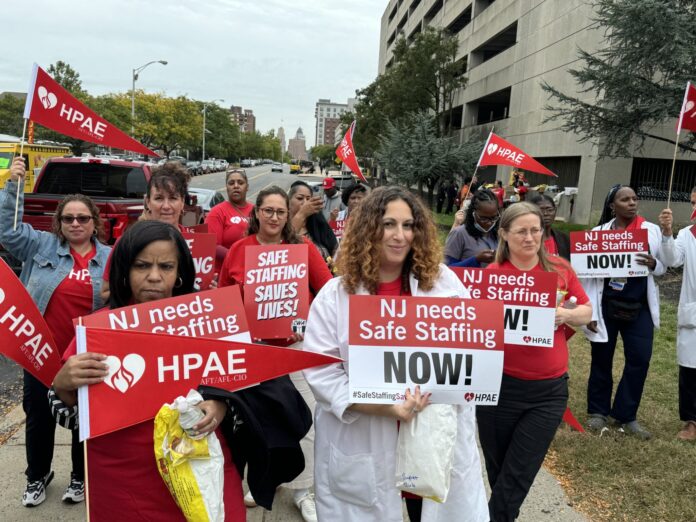Celebrating Nurses Week 2025 with a Renewed Call for Safe Staffing in NJ Hospitals
As we celebrate Nurses Week 2025 from May 6–12, it’s essential to go beyond appreciation posts and thank-you cards—we must spotlight the real, evidence-based policy changes that can protect our nurses and save patients’ lives. At the heart of this conversation is one clear, science-backed truth: safe nurse-to-patient staffing ratios work.
This isn’t a theory. It’s not up for debate. Decades of peer-reviewed research show that when hospitals ensure nurses have a manageable number of patients to care for, the results are overwhelmingly positive—not only for patients and nurses, but for the hospitals themselves.
What the Research Tells Us: Why Ratios Matter
California has had mandated nurse-to-patient ratios for more than 20 years. Since then, study after study—readily available online and in academic journals—has confirmed what healthcare professionals have long known: safe staffing saves lives.
Here’s what proper nurse staffing does for patients:
- ✅ Lower mortality rates – More patients survive their hospital stays.
- ✅ Fewer hospital readmissions – Patients recover more fully and don’t need to return.
- ✅ Shorter hospital stays – Patients go home sooner.
- ✅ Fewer ICU transfers – Complications are caught early and treated effectively.
- ✅ Less infection and injury – Bedsores, infections, and preventable injuries go down.
- ✅ Higher patient satisfaction – Patients notice when nurses are present and attentive.
These are not fringe findings. They are well-documented and widely acknowledged across the medical field.
The Nurse Experience: Why Staffing Saves Careers
It’s no secret that hospitals across New Jersey and the country are struggling with a nursing retention crisis. Nurses are burning out faster than we can replace them, often due to dangerous workloads and overwhelming stress.
Safe staffing doesn’t just improve patient care—it helps retain nurses, reduce turnover, and create a more sustainable healthcare workforce. When nurses have manageable patient assignments:
- 🔹 Job satisfaction increases
- 🔹 Burnout and stress decrease
- 🔹 Hospitals spend less on hiring and training new staff
- 🔹 The work environment becomes safer and more supportive
Hospitals that embrace safe staffing don’t just get healthier staff and happier patients—they perform better financially, too. Higher patient satisfaction scores often mean better insurance reimbursement rates. Safe staffing isn’t just the ethical thing to do—it’s the smart thing.
Two Approaches: A Tale of Two Employers
Last year, HPAE successfully negotiated new nurse-to-patient ratio language in contracts with four hospitals. Cooper University Hospital went a step further, proudly advertising its safe staffing policies in its recruitment efforts—a bold move that sets a new standard for attracting talent in a tight labor market.
In contrast, Hackensack Meridian’s actions raise serious concerns. Despite agreeing to safe staffing policies at Palisades Medical Center, the same organization is fighting similar measures at Southern Ocean Medical Center, represented by Local 5138. This inconsistency highlights a larger issue: why is patient safety negotiable in some facilities, but not others?
Cutting Corners Isn’t Fiscal Responsibility—It’s a Risk
Some hospital administrators continue to treat nurse staffing as a budget line to be trimmed, not a critical pillar of patient care. But let’s be clear: cutting nursing staff to save money is short-sighted and dangerous.
True fiscal responsibility in healthcare means investing in what keeps patients safe and staff supported. Patients expect 24/7 care, not overworked nurses who are too stressed to give them the attention they need. Every nurse who leaves the profession due to burnout is a loss of skill, compassion, and experience—costs that hospitals will pay many times over.
Legislation is the Path Forward
HPAE has been at the forefront of advocating for safe staffing for decades. Now, we’re urging lawmakers to pass the Patient Protection and Safe Staffing Act (S.2700/A.3683)—a statewide solution that would mandate nurse-to-patient ratios across all New Jersey hospitals.
We commend the legislators who have already signed on and call on the rest to stand with science, patients, and nurses. The time for half-measures and inconsistent policies is over.
Nurses Deserve Better—And So Do Patients
After the COVID-19 pandemic exposed the cracks in our healthcare system, nurses across the country have made it clear: they will no longer accept unsafe conditions. Just as we saw with the USW strike at RWJ Barnabas in New Brunswick, HPAE members are prepared to stand strong until meaningful change is achieved.
This Nurses Week, let’s do more than say thank you. Let’s fight for the staffing standards that keep our hospitals safe for everyone who walks through their doors.
HPAE (Health Professionals and Allied Employees) is New Jersey’s largest union of healthcare professionals, representing more than 15,000 nurses, social workers, technicians, therapists, researchers, and other healthcare workers throughout New Jersey and Southern Pennsylvania.
Sources:
“Science Shows Nurse-to-Patient Ratios Protect Patients ~ HPAE 2025 Nurses Week Op-Ed”












